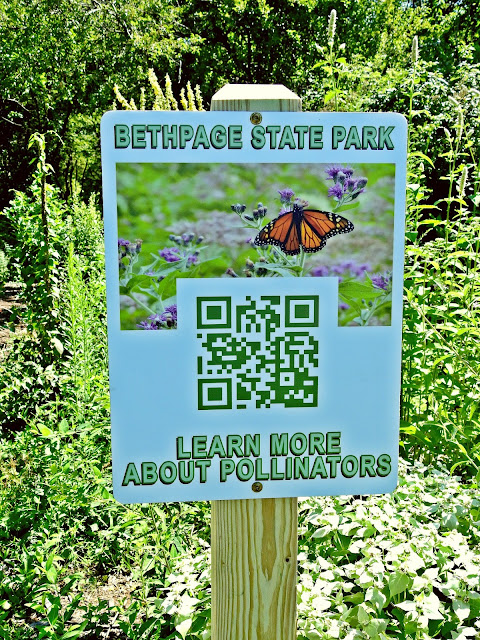 |
| A colorful garden does not just attract butterflies to feast, but students to learn! |
Right now, Bethpage State Park is at peak bloom and flourishing with all sorts of beauty! While the golfers just love it, this time of year also provides a great opportunity for other members of the local community to tour our grounds. With that in mind, we had the pleasure of hosting Sean Curry and his SUNY Farmingdale Horticulture class...to inspire and teach them all about our Park's gardening and wildlife initiatives!
The event started with our Director of Agronomy, Andrew Wilson giving a crash course on turf. Andrew discussed information on everything from the nature of cool season grasses (Poa annua and Bentgrass) to the soil composition needed for the perfect green. Students also learned about Bethpage State Park's commitment to environmental practices. One example is our adoption of the Minimum Level of Sustainable Nutrition Guidelines (MLSN). MLSN provides helpful data and recommendations for our Golf Course Superintendents so that they can mitigate fertilizer applications while still staying on their toes about soil health and golf playability needs. You'd be surprised but Bethpage State Park knows that "less is often more"!

Honey bees at the hive in The Valley on the Black Course
Next stop, students got a meet-and-greet with The Park's honeybees! At the hive, the class got a rundown on what it is like to care for honey bees and what is learned throughout the process. For example, Bethpage State Park has learned that no amount of plantings will persuade honeybees to feed on desirable native plants... first, that is! The Park has tested honey samples to see what bees feed on and the results were flowers in trees (Red Maples and American Chestnuts) and to our surprise, invasive flowers! Not to fret though, our native perennials, especially those blooming late summer, become important forage for honeybees when there is nothing else left! |

Next, Park Horticulturist Victor Azzaretto described his various gardening operations (in and out of The Greenhouse). Students learned all about seed germination and propagation. They also had the chance to explore some of the 200 native flowers and grasses grown for our pollinator gardens and golf course roughs respectively. The Horticulture class seemed very impressed by our personally designed seed chambers as well as the variety of native plants that one could grow in Long Island.

To see the fruits of our Greenhouse labors, we then took the class to the Green Acre Pollinator Garden! It was a perfect time to visit because flora was in bloom and butterflies were fluttering. Here, I pointed out Common Milkweed (Asclepias syriaca). Common Milkweed is a native plant that multiplies and thrives in patches around the park! This is important because milkweed is the Monarch Butterflies' only larvae host plant. As the ecologist, I spend a great deal of my summer protecting these patches, noting their growth and monitoring these locations for monarch activity.
Turning over the underside of the A. syriaca leaf,
I was able to show students how to identify a Monarch egg!
Last but not least, we wanted to send the students home with a parting gift -
a token of appreciation for their interest in our park's ecology and also as a
way to inspire them to create similar habitats in their very own yard.
A plant of their choice!
Just as we were wrapping up the tour, a Red Fox stopped by to bid the class farewell!
|
What a great way to end a field trip day! Thank you SUNY Farmingdale for visiting!
〰〰〰〰〰〰〰〰〰
Post photography and writing by Yael Weiss.
If you have a group that would be interested in a tour -- please feel free
to reach out by leaving a comment on this post!












Comments
Post a Comment